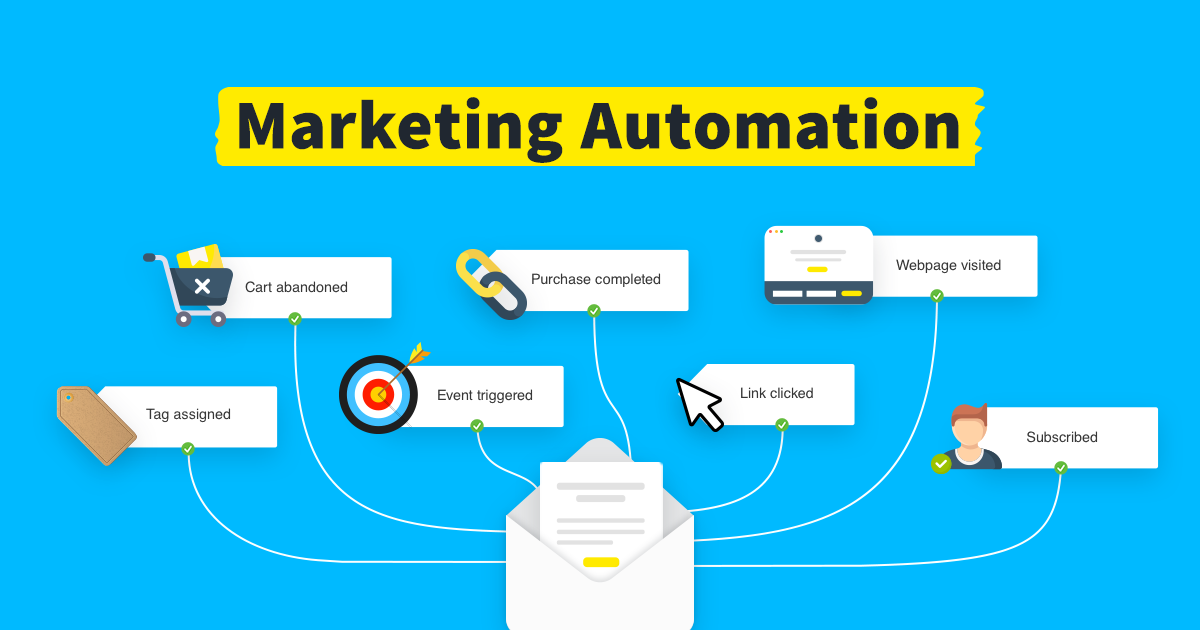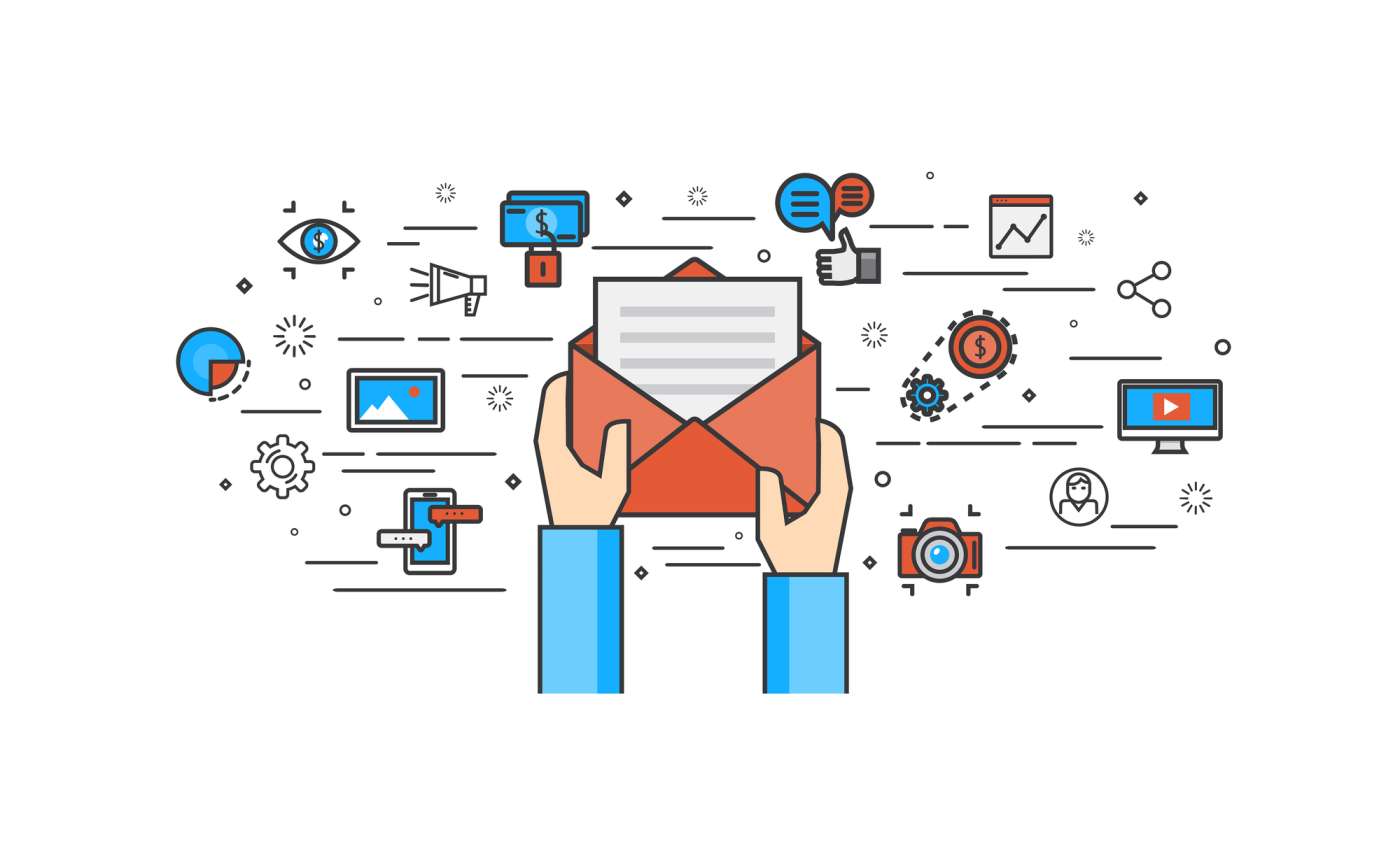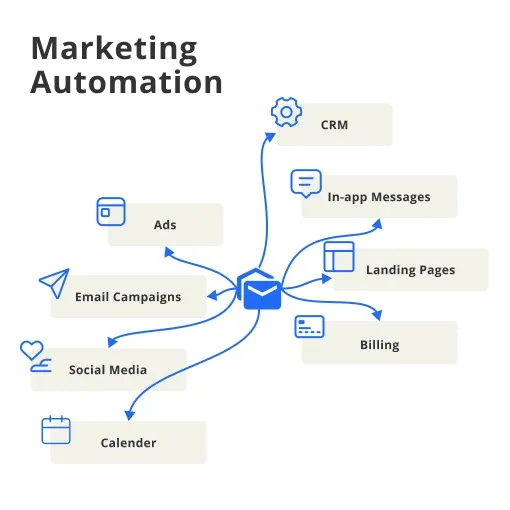What is Marketing Automation?

Marketing automation is the use of software and technology to automate repetitive marketing tasks, streamline workflows, and improve the overall effectiveness of marketing campaigns. It's like having a super-smart marketing assistant who never sleeps and can juggle multiple tasks at once.
Benefits of Implementing Marketing Automation
Time-saving: Automating routine tasks frees up valuable time for marketers to focus on strategic planning and creative work.
Personalization: Marketing automation tools can help segment and target audiences, allowing you to tailor messages and offers to specific customer groups.
Improved lead nurturing: Automated workflows can guide leads through the sales funnel, ensuring none fall through the cracks.
Data-driven decisions: With marketing automation, you can track and analyze campaign performance, making it easier to optimize and improve future efforts.
Increased ROI: By streamlining processes and targeting the right audience, marketing automation can significantly improve the return on investment for your marketing efforts.
Who uses Marketing Automation?
1. Small and Medium-Sized Businesses
Small and medium-sized businesses (SMBs) use marketing automation to streamline their marketing efforts, save time, and improve efficiency. It helps them manage tasks like email marketing, lead nurturing, and customer segmentation with limited resources.
2. Large Enterprises
Large enterprises with complex marketing strategies benefit from marketing automation platforms that offer advanced features, integrations, and customization. These tools help them coordinate campaigns, analyze performance, and optimize their marketing efforts across multiple channels.
3. Marketing Agencies
Marketing agencies use marketing automation to manage campaigns for multiple clients, monitor performance, and deliver consistent results. It enables them to provide clients with data-driven insights and improve the effectiveness of their marketing strategies.
4. Nonprofits and Educational Institutions
Nonprofits and educational institutions use marketing automation to engage donors, students, and supporters. It helps them manage communication, track engagement, and personalize content to build lasting relationships with their audience.
5. E-commerce Businesses
E-commerce businesses leverage marketing automation to optimize their sales funnel, nurture leads, and increase customer lifetime value. It helps them automate tasks like cart abandonment emails, product recommendations, and post-purchase follow-ups to boost sales and customer loyalty.
When to Implement Marketing Automation?
1. Identifying the Need for Automation
Ask yourself the following questions:
Are you drowning in manual, repetitive marketing tasks?
Is it challenging to keep up with leads and customer data?
Are you struggling to measure the success of your marketing campaigns?
Do you wish you had more time for strategic planning and creative work?
2. Timing and Business Growth
The great thing about marketing automation is that it can be implemented at any stage of your business growth. Whether you're a fresh-faced startup or a seasoned enterprise, marketing automation can help simplify processes, scale your efforts, and drive results.
However, it's essential to choose the right time for your business. A good rule of thumb is to consider implementing marketing automation when:
You have a clear marketing strategy and established goals.
Your team is consistently creating high-quality content.
You're generating a steady stream of leads, but need help managing and nurturing them.
You're ready to invest time, effort, and resources into learning and optimizing your marketing automation platform.
3. Transitioning from Traditional Marketing Methods
. Making the shift can seem daunting, but with a little planning and preparation, the transition can be as smooth as butter.
Audit your current marketing efforts: Identify what's working, what's not, and what can be automated.
Set realistic goals and expectations: Don't expect marketing automation to solve all your problems overnight. Rome wasn't built in a day!
Train your team: Ensure everyone is on the same page and knows how to use the marketing automation platform effectively.
Start small and scale up: Gradually automate one process at a time, optimizing as you go.
Why is Marketing Automation Essential?
1. Time and Resource Efficiency
Marketing automation streamlines repetitive tasks, such as email campaigns and social media posting, freeing up time and resources for more strategic and creative endeavors.
2. Personalization and Targeting
Marketing automation enables the delivery of personalized content and targeted messages to specific audience segments, enhancing customer engagement and conversion rates.
3. Lead Management and Nurturing
Automated lead management processes help identify, score, and nurture potential customers, guiding them through the sales funnel and increasing the likelihood of conversion.
4. Data-Driven Decision Making
Marketing automation platforms provide valuable insights and analytics, allowing marketers to make informed decisions based on data and optimize their campaigns for better results.
5. Consistency and Scalability
Automating marketing processes ensures consistent execution of marketing strategies and allows businesses to scale their efforts efficiently as they grow.
6. Improved ROI and Performance Tracking
Marketing automation enables the tracking of campaign performance and return on investment (ROI), allowing businesses to identify successful strategies and allocate resources effectively.
Suggested Reading:
Customer Driven Marketing Strategy
How to Choose the Right Marketing Automation Platform?
1. Identify Your Marketing Goals
Before choosing a marketing automation platform, clearly define your marketing goals and objectives. This will help you select a platform that aligns with your business needs, such as lead generation, customer segmentation, or email marketing.
2. Evaluate Features and Functionality
Compare the features and functionality of different platforms to ensure they meet your requirements. Consider aspects like email marketing, CRM integration, social media management, analytics, and personalization capabilities.
3. Assess Ease of Use
Choose a platform that is user-friendly and easy to navigate, allowing your team to efficiently manage marketing tasks. Look for platforms with intuitive interfaces, helpful tutorials, and responsive customer support.
4. Consider Scalability and Flexibility
As your business grows, your marketing needs may evolve. Opt for a platform that can scale with your business and adapt to changing strategies, offering flexibility in terms of features, pricing, and integrations.
5. Compare Pricing and ROI
Lastly, compare the pricing of different marketing automation platforms and consider the potential return on investment (ROI). Select a platform that fits your budget while providing the features and functionality necessary to achieve your marketing goals.
Applications of Marketing Automation
1. Email Marketing Automation

Marketing automation streamlines email marketing efforts by automating tasks like list segmentation, email scheduling, and performance tracking. It enables businesses to send personalized, targeted messages that engage and nurture leads.
2. Lead Generation and Nurturing
Marketing automation helps businesses generate and nurture leads by automating processes like lead scoring, lead assignment, and follow-up communications. It ensures timely engagement with prospects and helps move them through the sales funnel.
3. Social Media Management
Marketing automation platforms often include social media management features, allowing businesses to schedule posts, monitor engagement, and analyze performance across multiple platforms. This helps maintain a consistent and effective social media presence.
4. Customer Relationship Management (CRM) Integration
By integrating with CRM systems, marketing automation platforms enable businesses to better understand and manage customer relationships. This helps businesses personalize their marketing efforts, improve customer targeting, and maintain a unified view of customer interactions.
5. Analytics and Reporting
Marketing automation platforms provide comprehensive analytics and reporting features, allowing businesses to track the performance of their marketing campaigns and make data-driven decisions. This helps optimize marketing strategies, allocate resources effectively, and improve overall marketing ROI.
Best Practices for Marketing Automation Implementation
1. Define Clear Goals and Objectives
Establish well-defined goals and objectives for your marketing automation implementation, ensuring alignment with overall business strategies and measurable outcomes.
2. Choose the Right Platform
Select a marketing automation platform that best fits your business needs, taking into consideration factors such as features, scalability, ease of use, and integration capabilities.
3. Segment and Personalize
Effectively segment your audience based on demographics, behaviors, and preferences, and utilize personalization techniques to deliver relevant and engaging content to each segment.
4. Continuously Monitor and Optimize
Regularly monitor the performance of your marketing automation campaigns, leveraging analytics and insights to identify areas of improvement and optimize for better results.
5. Invest in Training and Education
Ensure your marketing team is well-versed in the chosen marketing automation platform and its features, providing training and resources to maximize the benefits and efficiency of the system.
FAQs
1. What is marketing automation?
Marketing automation refers to the use of software and technology to automate repetitive marketing tasks, streamline workflows, and improve efficiency across various channels.
2. How does marketing automation benefit businesses?
Marketing automation saves time, reduces human error, increases efficiency, nurtures leads, and helps businesses measure and optimize their marketing efforts for better results.
3. What types of tasks can be automated with marketing automation?
Tasks such as email marketing, social media posting, lead nurturing, customer segmentation, and marketing analytics can be automated using marketing automation tools.
4. Can small businesses benefit from marketing automation?
Yes, small businesses can benefit from marketing automation by streamlining processes, improving customer engagement, and maximizing their marketing resources.
5. How do I choose the right marketing automation platform?
Consider your business goals, budget, required features, and ease of use when selecting a marketing automation platform that best fits your needs.

